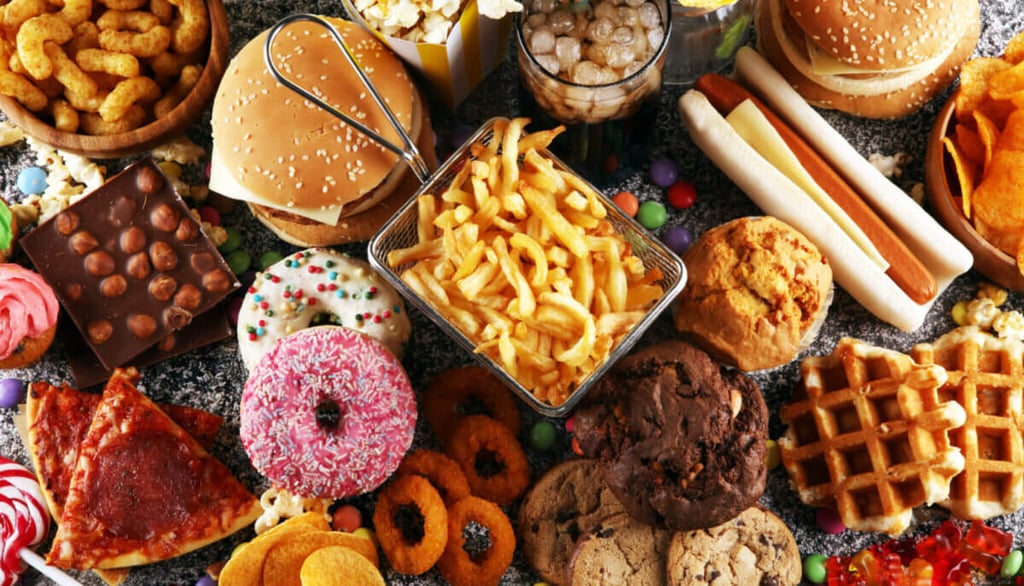The 10 Worst Foods For Your Gut: Stop Digestive Discomfort!
Discover the 10 foods most harmful to your gut and learn how to avoid them to regain optimal digestive comfort.
WELLNESSHEALTHBLOG-LIST
3/24/20253 min read


Are you tired of bloating, gas, stomachaches? Is your gut giving you trouble? It's time to clean up your plate! Did you know that certain foods, although common, can literally sabotage your gut flora and cause you all sorts of discomfort? In this article, we reveal the 10 most harmful foods for your digestive system, and we give you tips to replace them and regain optimal digestive comfort. Hang on, your stomach will thank you!
In Short:
Some foods irritate the intestinal lining and disrupt the microbiome.
Processed foods, rich in additives, are often to be avoided.
Excessive consumption of certain foods (even natural ones) can be problematic.
There are healthy and tasty alternatives to pamper your digestive system.
Nutrition is the key to a happy digestive tract and better overall health.
1. Chili Peppers: Watch out, they bite!
If you like spicy food, bad news. Spicy food, especially when consumed in large quantities, can irritate the lining of your stomach and intestine. Studies have shown that compounds in chili peppers, such as capsaicin, can disrupt the balance of your gut flora and cause heartburn and diarrhea.
2. Dyes and Additives: An Indigestible Cocktail
Ultra-processed chips, sour candies, fizzy sodas... All these products are full of dyes, artificial flavors, preservatives, and other additives that can disrupt your gut flora. Nutrition experts warn of their negative impact on the diversity of the microbiome, which is essential for good digestion and strong immunity.
3. Industrial Juices: Too much sugar, not enough fiber
Even if they proudly display images of fresh fruit, industrial fruit juices are often a bomb of refined sugar and preservatives. They can cause blood sugar spikes, feed bad bacteria in your gut, and promote inflammation. Prefer whole fruits or homemade pressed juices, without added sugar.
4. Gluten: Not always easy to digest
Gluten, a protein found in wheat, barley, and rye, can be problematic for some people, even without a diagnosed celiac disease. Studies suggest that it can cause inflammation of the intestine and disrupt digestion in sensitive people. Opt for gluten-free alternatives such as rice, quinoa, buckwheat, or legume flours.
5. Corn Syrup: A Sweet False Friend
This refined sugar, ubiquitous in processed products, is particularly harmful to the digestive system. It can promote the proliferation of bad bacteria, disrupt the absorption of nutrients, and contribute to chronic inflammation. Be vigilant on labels and favor more natural alternatives such as honey, maple syrup, or coconut sugar.
6. Microwave Meals: Convenient, But...
These prepared meals, often high in saturated fat, salt, and additives, are a real assault on your digestive system. They lack fiber, essential nutrients, and can disrupt the balance of your gut flora. Take the time to cook homemade dishes from fresh, quality ingredients.
7. Caffeine: In Moderation!
A cup of coffee can give you a boost, but excessive consumption can irritate your stomach and disrupt your intestinal transit. Caffeine can stimulate the production of gastric acid, cause heartburn, and worsen the symptoms of irritable bowel syndrome (IBS).
8. Trans Fats: To be Avoided Absolutely
Present in many processed foods (fried foods, industrial pastries, margarines...), trans fats are to be banned from your diet. They promote inflammation, increase the risk of cardiovascular diseases, and can disrupt digestion.
9. Artificial Flavors: Illusion of Taste
These flavors, designed in the laboratory, may deceive your taste buds, but they provide no nutritional benefit and may even disrupt your gut flora. Choose natural foods, rich in authentic flavors and essential nutrients.
10. Fried Fast Foods: Deep-Fried Hell
French fries, nuggets, donuts... All these foods, gorged with saturated fat and salt, are a real explosive cocktail for your digestive system. They can cause inflammation of the intestine, slow down digestion, and promote weight gain.
FAQ: Frequently Asked Questions About Foods and the Stomach
How do I know if I have a sensitive stomach? Common symptoms include bloating, gas, abdominal pain, diarrhea, or constipation.
Do I have to eliminate all these foods from my diet? Not necessarily. The ideal is to reduce their consumption and observe how your body reacts.
What foods should I favor for a healthy digestive system? Fiber (fruits, vegetables, whole grains), fermented foods (yogurts, kefir, sauerkraut), and healthy fats (avocado, olive oil).
Should I take probiotics? This can be helpful in rebalancing your microbiome, but seek advice from your doctor or a nutritionist.
Conclusion: Take Care of Your Stomach, Take Care of Your Health!
Your digestive system is an essential organ for your overall health. By adopting a balanced diet and limiting the consumption of the foods mentioned in this article, you can improve your digestion, strengthen your immunity, and feel better in your body. So, ready to pamper your stomach? Feel free to share your experiences and tips in the comments!
